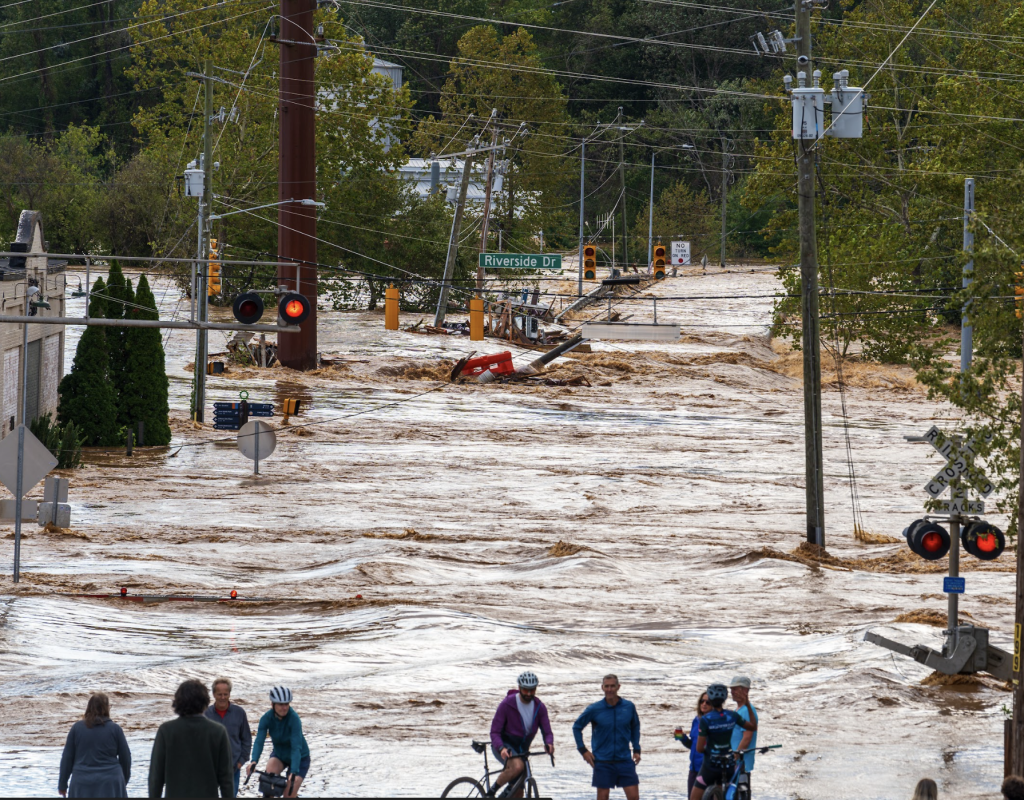
Interview by Jenna Flanagan of WBAI radio.
On Wednesday, October 9, two Pacifica Network member stations, WPVM-LP in Asheville NC and Listen and Be Heard Radio in Greenville, SC, gave on-the-ground reports from those devastated areas. They were interviewed by Jenna Flanagan, host of the radio show: We Decide, America at the Crossroads. The show is on WBAI-Pacifica in New York City and distributed to Pacifica Network, produced by Robert Hennelly, interim station manager and Keziah Glow, interim program director of WBAI. Thanks to WBAI for sharing this story.
Note: If you are interested in helping victims of the storm, information is provided at the end of this interview.
Jenna Flanagan: Hurricane Helene unleashed its devastating force, tearing through the southeastern United States and leaving a trail of death and destruction. The storm ravaged communities from Florida’s Gulf Coast all the way through Georgia, South Carolina and North Carolina and beyond, affecting millions. With 227 lives lost thus far, Helene is now the second deadliest hurricane since Katrina, and tragically, nearly half of those victims were from North Carolina, where the search for bodies continues in the remote hollows of the Blue Ridge Mountains. With so many climate fuel disasters, the most vulnerable were those in isolated and impoverished areas where essential services like power, water, cell phones and Internet communications were just completely wiped out.
When lives depend on staying connected, it’s community broadcasters who remain the lifeline for many. We are here with our Pacifica affiliate stations in Asheville, North Carolina and Greenville, South Carolina. Davyne Dial is the manager of WPVM in Asheville. Davyne, just how are you doing after the storm?
Davyne Dial: Well, we were extremely fortunate. The station is downtown, and the downtown area only lost power for around a day. So, our station has been on the air, but we do not have water. So as far as that is concerned, you have to learn what to do whenever you don’t have water. But the city of Asheville, itself, has been devastated.

Jenna Flanagan: This hit home for me in a unique way, because while I am in New York State and I live in the Hudson Valley, which is also a mountainous region I foolishly thought that the higher elevation would somehow make us impervious, but what we’ve learned from this storm is that’s not the case. For people who might not be familiar with the topography of Asheville, it’s in the Blue Ridge Mountains. Give us a sense of what has taken place and why the devastation was so just epic.
Davyne Dial: I’ve heard reports that 20 to 30 inches of rain fell in a three-day period, on the high mountains in the wilderness of Western North Carolina, which is a massive area. The rivers and streams flow down into the valleys, which are much narrower areas. The momentum of that much water on our already waterlogged soil in Asheville made all of that water runoff into the streams and rivers, and created such a momentous force that it literally could move a full cement truck full of concrete. We have never experienced anything like that before, and it’s a monumental disaster for the region.
Jenna Flanagan: From what I understand, especially for some of the smaller, remote towns, the force of that water and that sliding mud from the mountains, just washed the towns away.
Davyne Dial: Exactly, exactly; towns just washed away. The recovery has been intense. We’ve had a lot of people from around the country here for recovery, and they have not finished their job, because a lot of the remote areas are very difficult to get to. They are having to use horses and Pack Mules to get up to certain areas because the roads were washed out.

Jenna Flanagan: Wow, wow. We also have Martha Cinader with us on the phone. She is the manager of Listen and Be Heard Radio, our internet affiliate in Greenville, South Carolina. So first of all, thank you for joining us. How are you and your staff holding up?
Martha Cinader: Well, we are okay here, although, unfortunately we still don’t have any internet, so the station continues to be down. We’re managing; the destruction in Greenville was not quite as massive as further up north there in Asheville but we always have an issue with power lines and trees. Fallen trees was major problem here, and the loss of electricity, which is still not back for everybody in the community, but fortunately, we have running water.
Jenna Flanagan: You don’t realize how important that is until it’s gone. Davyne, in the wake of this storm, and its devastation, we’re, unfortunately, in a politicized period in American politics. It all got politicized immediately, especially about whether relief was getting to people fast enough. From your personal observation and what your station’s reporting has been able to glean, where does the relief stand?
Davyne Dial: In my opinion, the relief work has been excellent, nationally, statewide, and locally. Also, people are banding together to help each other, to make sure everyone is okay. So the propaganda that there’s been very little help, that’s a, um, flat out falsification.
I happened to be out of town when the storm hit. I came back that next Tuesday morning from Charlotte and every vehicle that we passed along the way was either a FEMA convoy, trucks loaded down with generators, trucks loaded down with water, and the help has been phenomenal. But it is a hugely devastating thing that has happened, and it’s going to take long term help to get us back to a livable situation. We continue to need help.
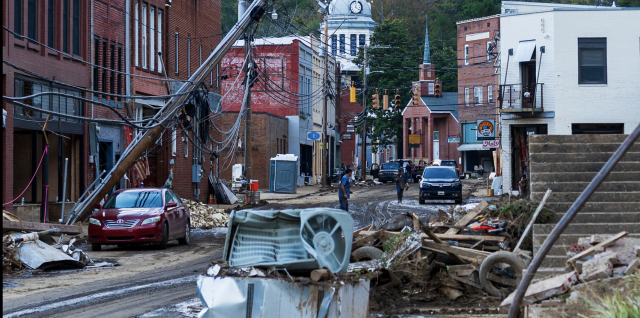
Jenna Flanagan: Of course, Martha, since you were saying that you aren’t as far north, does that mean that you’re at a lower elevation than Asheville?
Martha Cinader: We have a producer, Tony Robles, who is between Greenville, South Carolina, and Asheville, North Carolina. He is in Hendersonville, and his mother was way up at the top of the mountain, where you just would never expect a hurricane in that case. Unfortunately, in between where she is and Asheville, Chimney Rock was completely destroyed and the roads were cut off. They had to airlift his mother and father-in-law down from the mountain. These are the types of situations that they’re now facing: having to apply for FEMA because they don’t know when they will be able to get back to their house.
I think that speaks to the real thing about this. No one expected a hurricane to hit this area like this; it was due to climate change, and I think when we look at our response to how we deal with this after FEMA, we can’t just simply think about going back and rebuilding. We have to take into account a sort of local resilience. This was brought home to us in a very dramatic way, not just here, but also with the one that’s coming to Florida. If we say we’re going to build back, we have to think about what it is we’re building back and the type of infrastructure that we’re relying on, because people have had their infrastructure now completely blown away, and it won’t go back for at least a decade in many places.
And so, do we want to go back to what failed us? We can’t, really, because we’re running out of resources to do that. All of this is directly involved with the oil and gas industry, and climate change itself. I was thinking of the irony of all these generators that I was hearing about as people found there were alternatives to electricity, but the day will come when we won’t be able to keep those generators running either. And it’s not that far off. Also, in the healthcare that we’re talking about, the day is coming when our hospitals will not be able to rely on the things that we do now.
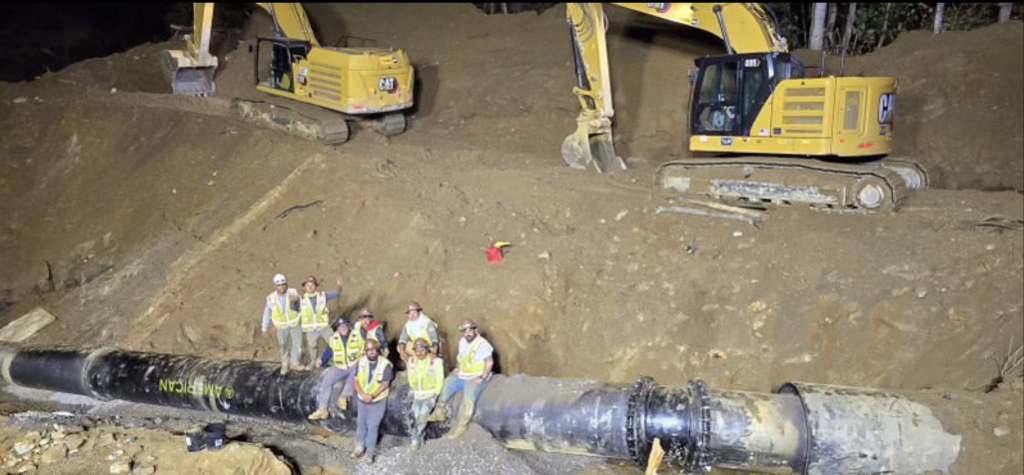
Jenna Flanagan: Is this a conversation that’s being had, not just in Asheville, but of course, further up? Also, there is another conversation about lawmakers from those states who voted against FEMA funding, the very support that people are relying on right now,
Davyne Dial: Yes, and that is on them. They will be dishonored because of that, because FEMA is there to take up the mantle, so to speak, in devastating situations like this. These situations are too much for a local or even a state government to handle. You need the power of the United States. The United States is the wealthiest country in the history of the world. It has been for over a century. Our country can afford to have backup help for people in devastating situations. It was unconscionable for them to vote against that sort of funding.
Jenna Flanagan: Okay, so I again, my heart completely goes out to you both. What have been, I guess, your stations’ roles? How many people have been looking to your stations for communication – not just about where to go, how to sign up for what, how to get access to what, but also, in some cases, maybe even to communicate about loved ones. If you can’t call somebody or get a hold of them in the way that you used to be able to, perhaps there’s a chance they have a hand crank radio and can hear that a loved one is trying to reach out to them, or something of that nature.
Davyne Dial: Before the storm happened, WPVM sent out public service announcements saying, ”If you lose power and internet, heavy, if you are in a low lying area, and it’s raining heavily, get out of there and get to a safer place. Make sure you have gas in your car. If you have a radio that is battery operated, have that ready to listen to find out what is happening, and where you can go for help.”
Since what has happened, we now have hourly public service announcements dealing with: what FEMA can do for you and how to get in touch with FEMA, what you need to be doing to pay attention to health issues and how to handle chronic health issues, or how to go get food and water. Those hourly public service announcements are going out on the air now, both on the air and on our website for people who might not be able to get the radio station but can go to the website. If they have an internet connection.
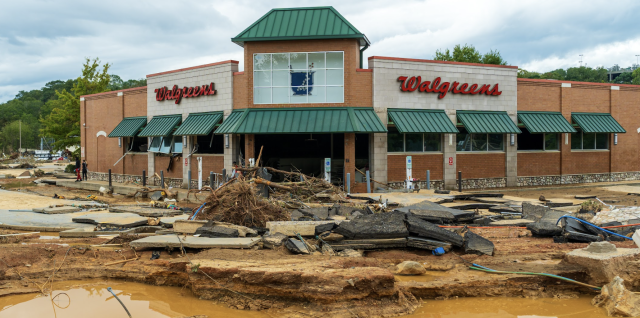
Jenna Flanagan: Martha, how is your station stepping into the critical role of communications.
Martha Cinader: It has highlighted how critical our role is. We’re very new; we only recently got up and running and became an affiliate. We are an internet station and unfortunately, because Greenville’s internet is down, we’re not able to have a stream right now. So, we have been trying as best we can to share local information in other ways; it’s so critical for helping people find the things that they need. They don’t need to tune in to national news about what happened here as much as where they can find a hot meal or freshwater and things like that.
We do have public service announcements queued up for the moment that we do get back the internet. But it also has us thinking about the need for a variety of ways to be able to provide communication as a local station, in the future. So we would not lose internet access in this type of situation, by either a satellite link or other alternative ways – so that people can support each other when they’re cut off from everything else.
Jenna Flanagan: Martha, you bring up such an excellent point. National news is not going to be at the top of people’s list, right now in these areas. But it is still election time. I mean, I don’t even know where to begin. Martha, are there still polling places or have they been washed away? Is there any plan in place to make sure that people can still cast their ballot amidst this nightmare?
Martha Cinader: I don’t even know the answer to that question. I’m really coming to you more as a cut off citizen right now, dealing with Covid, as well as the hurricane, and am extremely isolated at the moment. I would hope that voting booths will be open, and that people consider, above all else, climate change. This storm should really bring that home to us. To me, it’s the only issue worth voting on. We all need to raise our heads, look up, and understand that these storms are coming our way no matter where we are.
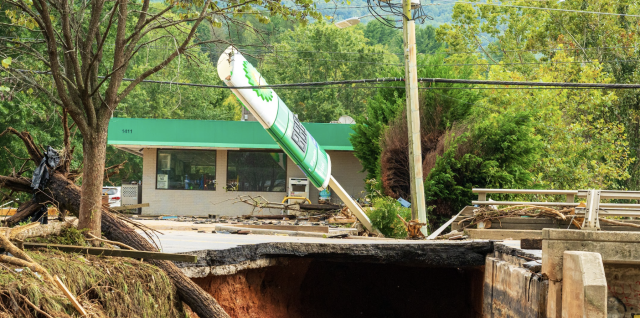
Jenna Flanagan: Davyne, same question to you. Not to make this New York centric, but we did have a similar situation when Hurricane Sandy absolutely devastated New York City, and that was right before an election. It’s essential that people are still able to vote. Is there any indication that that’s even on anyone’s radar right now?
Davyne Dial: It is on everyone’s radar. I have been watching local coverage and I have not heard that our voting has been interrupted…I did see something like “the show will go on,” so to speak. I’m not sure about remote places at all, but I do know that in Asheville, most of the voting booths are not in the low lying areas where storms were and we do have most of our power back in the city. So at least in the Asheville area, it will be okay.
Jenna Flanagan: Both of your stations are within the Pacifica Network, so you’re certainly not alone, and please feel free to reach out to us anytime to give us updates on how the recovery process is going, because we genuinely do want to know. Also, if there’s any way that people can give help, not just hearing about the storm, but hearing firsthand your accounts of what’s going on. And if they want to be able to help, and make sure that their money goes directly to the people, is there any advice you can give?
Davyne Dial: I have provided you all a list (see below), and I hope that you can use that or put that out. There’s been a lot of help, but help is going to be needed for the long term, because there’s major infrastructure damage that has happened, and that’s going to affect everyone here in the region
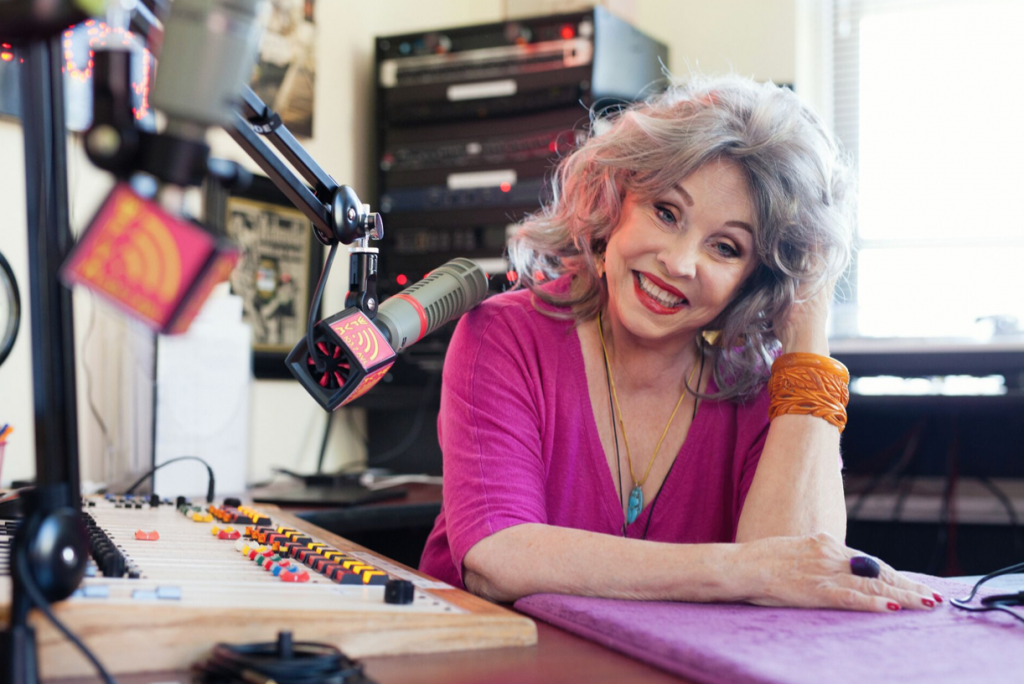
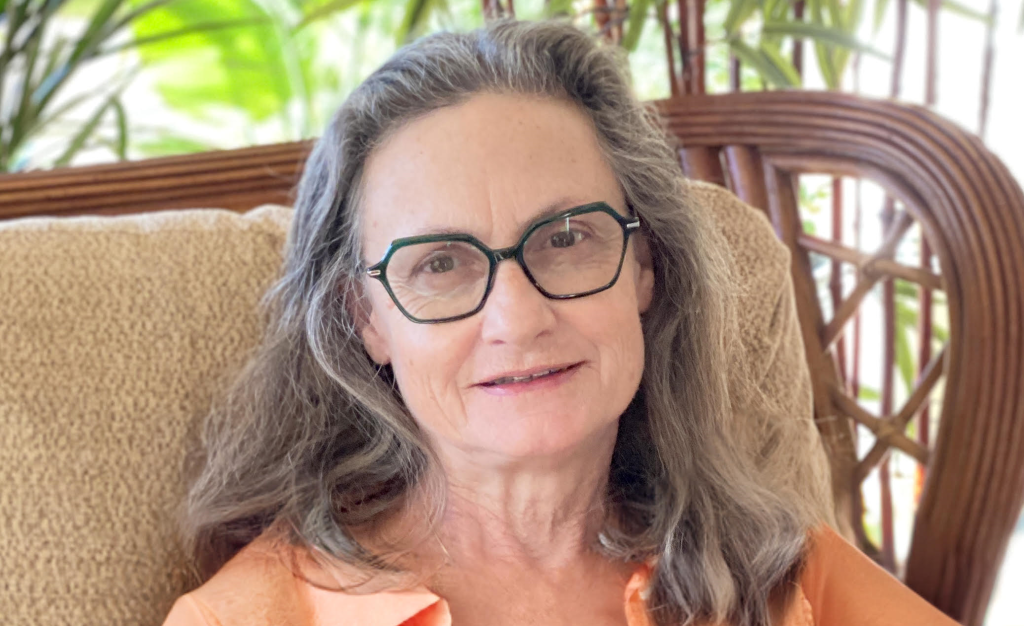
Jenna Flanagan: Well, please keep us updated. The way our news cycles tend to work, something else happens, and we all sort of move on and forget. But the devastation looks like we’re looking at a year, two years, or more; this is ongoing. In fact, I take that back. I have family in New Orleans, and it can take a generation to get over something that devastating, correct?
Martha, you’re saying you’re calling in as an isolated citizen, and for that, again, we hope that you are well.
Martha Cinader: We certainly hope to be up very soon, but we are actually sharing things at ListenandBeHeard.net and I would encourage people to look for local sources to donate to. We are making an effort to share all the resources that people have in the community and we will continue to do that. Hopefully we’ll have streams and do so on our streams as well.
Jenna Flanagan: Any parting thoughts?
Davyne Dial: Well, thank you for having us on the air and informing the people in your area about what’s going on down here in western North Carolina, a beautiful part of the world, I might add. And we will prevail!
Jenna Flanagan: Oh, absolutely. If there’s one thing I have learned about, it is the hearty – dare I say even scrappy- “will not die” attitude of the Blue Ridge Mountains. So, we do hope that the “prevailing” comes sooner than later.
Davyne Dial: Thank you.
Martha Cinader: Thank you.
Jenna Flanagan: I want to thank you both, Dayven Dial at WPVM-LP in Asheville, North Carolina, and Martha Cinader, manager of Listen and Be Heard Radio, our internet affiliate in Greenville, South Carolina. Both are part of the Pacifica network family. Look at their relief list and you can definitely reach out and offer your support to help the people who have been just devastated by Hurricane Helene. Thank you both so much for joining us.
Ways you can help:
Donate to the relief fund managed by United Way, which disperses funds to vetted local organizations participating in hurricane relief.
Donate to NC Community Foundation Disaster Relief Fund to support the long-term recovery process.
Donate to support an associate of WPVM radio who is a professional firefighter and woodsman who is organizing cleanups. He is asking for support for chainsaw supplies, which are currently scarce, to be distributed and also used by his own team for cutting fallen trees. Any extra funds will go to local relief efforts. Learn more and donate here.
Donate to NC Arts Disaster Relief Fund for funding and assistance for artists and art organizations affected by Hurricane Helene.
Find an extensive list, with contact information, of local groups cooperating to share resources and care at WNC Mutual Aid/Grassroot Fundraising
Top photo by Matt Henson. All photos by Matt Henson used with permission. Photos of Davyne Dial and Martha Cinader used with permission.
